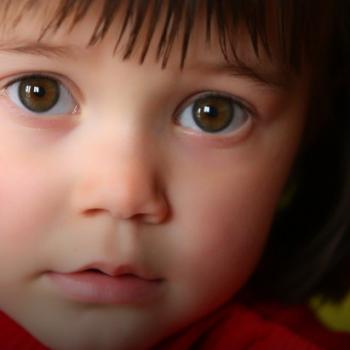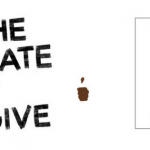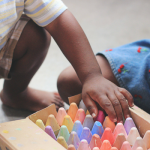My grandfather used to take us fishing on his speedboat and buy big sacks of donut holes for the ride back. He made goofy faces across the dinner table and created the most ornate, tinsel-covered Christmas trees. He taught us how to use computers before computers were a thing, which meant that my very first email was typed out to my grandfather. He wanted to be sure we could connect even though we lived a state away.

But Grandpa was also a racist.
He griped about “those blacks” and stared down people of color when he thought they were walking too close to us. He didn’t trust the car mechanic or the boy in the Dairy Queen drive-thru. He didn’t like Oprah and thought her show was overrated. He never swore, but even at a young age I knew that this man I deeply loved had filth coming out of his mouth.
Further complicating things was the fact that no one ever called him out on it. To my knowledge, no family members interrupted and let him know you can’t talk about fellow human beings that way. It made me wonder if all my aunts, uncles and cousins were also closet-racists. Surely someone would have said something if they disagreed.
Because Grandpa understood my dry sense of humor, remembered my favorite kind of popsicle, and praised every single creative thing I ever did, somewhere along the way I decided it wasn’t my place to speak up. My grandfather’s racism wasn’t a deal-breaker in my relationship with him. It was just Grandpa being Grandpa, and everyone has flaws, right? When he said something a bit “off”, I simply combated it in my head by listing all the things I loved about him. I had a big list, which made it easy.
Things slid off track the year my daughter turned two. She was attentive and impressionable – I had to learn to spell aloud the messages I didn’t want her to hear. But more importantly, she attended a preschool where the majority of kids were black or Latinx. Our church had the same makeup, as did our neighborhood. Grandpa was family, but the people we interacted with everyday – people we shared meals with and chased after kids with and worshipped with – they were my family too. Racism was in my face every day, because I was surrounded by people I loved who were daily being crushed by it. Racism was suddenly a deal-breaker.
It was Thanksgiving that year when I heard Grandpa, surrounded by family watching football on the couch, complain aloud that more and more of the pro players were black. I gently ushered my daughter out of the room as heat rushed to my face. A mixture of embarrassment and anger.
Before heading home I cornered Grandpa in the kitchen. I said the words I wished I’d said years and years before.
“Grandpa, the way you talk, the jokes you tell, the beliefs you have …. they are racist. And racism is hate. I know that you don’t like black people. But not all black people are the same, just like not all white people are the same. It’s unfair to judge an entire group of people based only on skin color. So if you aren’t able to speak differently, then I can’t bring my kids here. They love you and I love you and we do want to visit, but I cannot risk my daughters being hurt and confused by the way that you speak.”
Grandpa stood slack-jawed. He rubbed his brow. He mumbled something about how he’d been hurt by a group of black teens when he was a boy. I shook my head. “I’m sorry that happened to you. I’ve heard that story and it’s awful. I love you, but I will not tolerate hateful language around my child.”
Grandpa stood silent while my family made our way to the door.
On subsequent visits, Grandpa cleaned up his words. He was grateful for every visit we made. He spent weeks in his workshop building, sanding and painting a bright pink baby doll cradle for my daughter’s third birthday. When my second daughter turned three, despite his failing health, he built her a white one to match. He didn’t want them to fight over them, he said. But I think he also wanted both girls to know how much he loved them as unique individuals, just as he loved all his grandchildren.
He died suddenly of a heart attack the next year.
I wish I could say definitively that the words I spoke to my Grandpa a few years before had completely changed the way he felt about people of color. I wish one little moment held that much power. I wish I knew that on the day he died, my grandfather’s heart knew only love, kindness and tolerance. I wish I could tell you that his death did not tear me up inside – not just because I missed him terribly, but because I never got to see him enjoy a friendship with a person of color.
Because I truly believe that this man whose heart was so big, so generous and so open to me and to many others, would have been cured of his illness by intentional friendship with someone who didn’t look just like him. I think his comfort in the white pocket of America gave him an excuse to not change. I think the lack of voices speaking truth to him gave him the impression that his racism was acceptable.
I don’t know the final state of my Grandpa’s heart, but I hold on to the little glimmers of hope that change can happen. Maybe it already had. A few months before he passed, Grandpa visited me in the community garden I had created in my urban neighborhood. My neighbor, a black woman, engaged him in conversation about the various ways to nurture tomato plants. He loved growing gardens too. I saw his mouth twitching into a smile while they talked. Later that week, he insisted on bringing out his own tiller because he said the one I was using wasn’t powerful enough. He wanted to make sure the roots of our plants could reach deeply in the soil, spreading wide and producing heavy, sweet fruit for me and my neighbors.
My grandfather likely didn’t understand my advocacy for diversity, or my Facebook memes on social justice, or my wish to keep living in a neighborhood that was more black and brown than white. He didn’t understand why I loved who I loved, but he loved me. And he respected me. And he wanted to stay connected to me despite our differences. I like to think that for a short moment in his life perhaps, a tiny seed had taken root.
Get a free download of a Christian parenting manifesto that helps us guide children into healthy spirituality + a guide on How to Raise a Feminist Son + the most helpful parenting resources with progressive values.
Courtney Christine resides in Evanston, IL, with two brilliant daughters whom she urges to be brave, strong and kind. She works as office manager at Reba Place Church, a Mennonite congregation put on the map for its 65-year-old intentional Christian community. The social work aspect of her job brings her endless joy, as she has a front row view of heart-transforming efforts at racial reconciliation, radical peacemaking, and social and economic justice. Courtney’s poetry, songs and essays are influenced by her personal journey towards wholeness and healing. When she’s not playing ukulele badly or cooking up supper for a hundred neighborhood kids, she plays a mean game of Ultimate Frisbee and wears her bruises proudly.












